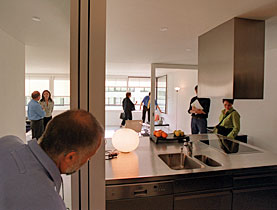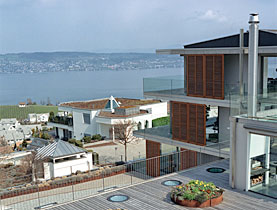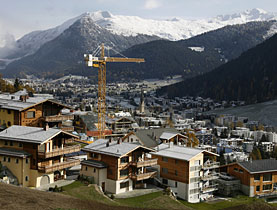Soaring rents force families out of Zurich

Families and people on low incomes are finding it increasingly difficult to find apartments in Zurich city as wages fail to match spiralling rental prices.
The situation is being blamed on an influx of skilled foreign workers, exploitative landlords and the wealthy buying up second homes. Observers say outlying districts are also now feeling the pinch.
The cost of living in one of the world’s most expensive cities has never been cheap. But rental prices for first time tenants have increased some 20 per cent in the past five years, according to Zurich’s tenants’ association.
Spokesman Niklaus Scherr blamed a wave of European Union employees, mostly from Germany, who have flocked to Zurich since Switzerland signed a bilateral agreement with the EU that opened up borders to workers.
These foreign staff have filled vital gaps in the workforce from finance to teaching and nursing. But the tenants’ association argues that the highly paid workers have pushed up rents to a point that many locals cannot afford.
“When the bilateral agreements were debated everybody talked about wage dumping, but no-one thought about the impact on the rental market,” Scherr told swissinfo. “But it has put a lot of pressure on rents.”
“Landlords are now taking more and more apartments out of the general market to provide more expensive accommodation, furnished and with services, to these new people who can afford to pay more.”
Severing contact
Reducing the number of apartments available to people on low or average incomes has made an impact in a city that has traditionally experienced a low rate of unoccupied accommodation. The proportion of vacant apartments has dipped to 0.03 per cent in recent months compared with just short of one per cent ten years ago.
Margrit Hürlimann, a social worker with the Roman Catholic charity Caritas, said the situation is putting a strain on the very fabric of the city.
“Zurich is a rich city, but there are still many people who need to find low rental prices. They are now in trouble because it is becoming very difficult to find it,” she told swissinfo. “If it continues like this then it will become difficult for essential workers, like nurses and police officers, to live here.”
“Families are having to relocate further away from the centre, finding new schools for their children and severing links with their social contacts.”
Remedies required
Urban centres such as Winterthur, situated 25 kilometres from Zurich, are also experiencing housing shortages as a result despite a building boom in recent years.
“Local people are migrating to Winterthur because it is less expensive and has very good links to Zurich,” said Scherr. “Rents there used to be 15 per cent cheaper than Zurich, but the gap is narrowing.”
The tenants’ association has called on the authorities, cantonal and federal, to do something about the situation. It wants housing cooperatives, non-profit bodies that offer affordable accommodation, to have the right to construct a quarter of all apartments on new building sites.
And it called for tougher laws to prevent landlords from terminating existing contracts to fill their properties with higher paying tenants.
swissinfo, Matthew Allen in Zurich
Switzerland is not a country of homeowners, with the rate of ownership rising from just 31% in 1990 to around 37% at present.
In international comparison, the 34.6% Swiss home ownership rate in 2000 compared with 45% in Germany, 54% in France, 69% in Britain and the US, and 81% in Spain.
Real estate specialists Wüest & Partner estimate that the average rental price of a four-room apartment in Switzerland stands at SFr1,450 ($1,322).
The average rent for the same property in the cheapest district of Zurich is SFr1,800 and SFr2,600 in the city centre.
Wüest & Partner agrees that rents have risen 20% in Zurich in the last five years, but added that the same increase can be observed throughout Switzerland.
They observed big rent increases in the years 2004 and 2005, slowing down since then. But they expect another leap within the next two years.

In compliance with the JTI standards
More: SWI swissinfo.ch certified by the Journalism Trust Initiative












You can find an overview of ongoing debates with our journalists here . Please join us!
If you want to start a conversation about a topic raised in this article or want to report factual errors, email us at english@swissinfo.ch.